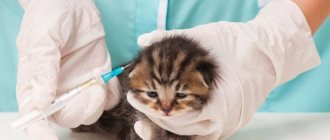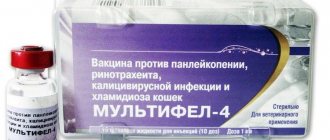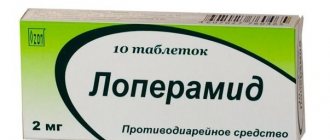Your attention will be offered information about the methods of using these groups of drugs for worms, their varieties and the need for administration of the drug.
Why worm your dog before vaccination?
Why should you give your pet an anthelmintic before vaccination? A parasitic infection negatively affects the animal’s immune system, significantly weakening it. If you do not worm your four-legged pet before vaccination against rabies, distemper, enteritis and other dangerous pathologies, its body, weakened by the negative influence of parasites, may react to the administration of the drug in an unpredictable way: an increase in body temperature, uncontrollable vomiting, and diarrhea. As a result, the animal simply will not develop resistance to the pathogens of these diseases.
There is another reason why it is necessary to “worm” your pet before a scheduled vaccination. Worms, or rather, their metabolic products, often become the culprits of an allergic reaction. Vaccinations use potent agents. Their introduction is stressful for the dog’s body, which can significantly increase allergies provoked by parasites.
Why do dogs get vaccinated?
Man has created dog breeds with specific qualities. Animals acquired useful properties at the expense of others. The result of selection was the pet's increased susceptibility to viral diseases. Plague, parvovirus enteritis, and infectious hepatitis are deadly for puppies and can harm the health of adults. Just because an animal doesn't socialize with other dogs doesn't mean it's protected. The virus can be brought by the owner on clothes or shoes.
Vaccination helps protect an animal from diseases. The pet is injected with inactivated microorganisms, the immune system produces specific proteins - antibodies, which reach a bactericidal concentration two weeks after the injection. To produce gamma globulins, the animal must be healthy and well-nourished. And the worms make him sick and take a good half of the food for themselves.
How to prepare a dog for vaccination - preparation rules
All instructions listed above must be followed. The dog must be:
- healthy,
- not exhausted
- with a good appetite.
If pathologies are identified, take measures to eliminate them. Do not use immunostimulants or immunosuppressants 30 days before vaccination. Do not vaccinate puppy dogs. Before vaccination and after, do not change the diet and conditions of detention. Avoid transportation. 10 days before vaccination, carry out deworming. Strictly follow the indicated age of the puppy in the instructions for the drug and repeat at the appointed time. Vaccinate the litter at the same time.
Is it possible and necessary to wash a dog before vaccination?
It is not recommended to bathe your dog before vaccination and 10 days before it. You can get by with wiping with a napkin or washing without completely soaking the dog and only if absolutely necessary. Puppies should not be bathed at all before their first vaccination. They may catch a cold and their immunity will weaken. Their contact with the outside world is very limited and it is difficult for them to become polluted to a critical level.
During quarantine, take precautions as indicated above. When re-vaccinating, adults can undergo water procedures earlier, but only in warm weather and not for long. Before vaccination, bathing is possible under the same conditions.
Do I need to feed my dog before vaccination, when can I give food after?
Of course you can. Before vaccination, a healthy dog eats as usual and on a regular schedule.
Important! Do not change your diet and do not give foods that can cause allergies!
After vaccination, the rules are repeated as before the procedure. The diet remains the same. Sometimes feeding times change. Immediately after vaccination, the dog may refuse to eat and drink only water for a while. It is not recommended to add sugar to water.
What needs to be done before the first or repeated vaccination of a puppy or adult dog?
Before immunization, the animal must undergo examination and appropriate preparation.
Important! If a deviation from the norm is detected, vaccination is prohibited.
Health check
The first step to prepare your dog for vaccination is thermometry. She should show 37.5-39.2. For puppies and small breeds – 38.5-39.4. The mucous membranes should be normal without signs of inflammation or anemia. The coat is healthy-looking and shiny, and does not fall out. Avoid wounds and skin defects. Appetite is within normal range. If your pet's condition is questionable, you can do a general blood test. This will exclude possible diseases. The vet will do everything. You can take a course of immunostimulants 30 days before vaccination.
Is it necessary and why to do worming?
Before vaccination, the dog is driven away from worms every time before this procedure. Puppies being vaccinated for the first time are dewormed twice. The fact is that a dog infected with worms becomes weakened. Immunity decreases. With a high degree of parasite infestation, the animal is exhausted, and there can be no talk of a qualitative response to the vaccine.
The worm in the intestines releases toxins that poison the body. The immune system will not be strengthened. On the contrary, an adverse reaction to the drug may occur, and the consequences are unpredictable. Vaccination itself deals a blow to all the vital systems of the pet, and if they are weakened, the load can become unbearable.
Is it necessary to give anthelmintic to a puppy if he does not go outside?
Pre-vaccination deworming is a mandatory procedure in all cases without exception. No responsible veterinarian will allow an untreated animal to be vaccinated. It doesn’t matter whether it walks on the street or is never outside the living area.
A puppy that has not yet been taken out for walks can become infected with worms through contact with the outdoor shoes of the inhabitants of the home, through the bite of a flying insect that carries endoparasite eggs that entered the house through an open window, or from an infected mother. The owner of the dog may not even realize that his four-legged pet is infected with helminths.
Vaccines that are given to a puppy after a preventive procedure, how to worm a puppy
Many medications used on dogs at an early age are divided into two groups, as well as two properties:
- Alive
- Inactivated
- Monovalent
- Polyvalent
In general, we can say that the vaccines used to protect the health of puppies are safe and do not cause complications. There is a vaccine called “Nobivak” - its ability to resist Plague disease, and so this vaccine is approved for use from four weeks of age. Let's look at commonly used vaccines:
- Plague of carnivores - Plague (Biovac-D, Multikan-1, EPM, Vakchum, Canivac C)
- Parvovirus enteritis - (Biovac-P, Primodog, Nobivak Parvo-C)
- Hepatitis - (Kanivac CH)
- Rabies - (Nobivak Rabies, Rabizin, Defensor 3, Rabikan)
- Leptospirosis - (Nobivak Lepto, Novak-L)
- Piroplasmosis - (Nobivak Piro, Pirodog)
- Adenovirus - (Biovac-PA, Multikan-2, Triovak)
- Plague, Enteritis, Coronavirus enteritis, Edenovirus, Leptospirosis, Dermaphytoses - (Multican-7)
- Plague, Hepatitis, Enteritis, Parainfluenza, Adenovirus, Coronavirus, Leptospirosis - (Vanguard Plus 5 L4 CV)
- Plague, Hepatitis, Enteritis, Parainfluenza, Adenovirus, Leptospirosis, Rabies - (Biocan DHPPi + LR)
- The cost of the first vaccination ranges from 500 to 1500 thousand rubles.
- The cost of the second vaccination is from 400 to 1500 thousand rubles.
- The cost of anti-worm medications ranges from 80 to 450 rubles.
Deworming before vaccination: necessity and timing
Veterinarians say that before vaccinating a pet, it is necessary to deworm it, since the vaccination is given only to completely healthy animals. Deworming is carried out ten days before the vaccine is administered.
Reference. If, after feeding the drug, you find worms in the feces, give the dog the deworming drug again after a week, and then examine the pet’s stool again. If there are no helminths, you can get vaccinated after 10 days.
Disinsection before deworming
Parasitic worms enter in two ways - through intrauterine infection or through an ingested ectoparasite. Therefore, fleas must be removed before deworming. Products that protect adult dogs from ectoparasites are toxic to children. They can only be treated with shampoos containing repellents that repel arthropods. The protection period is about a week. Therefore, 7 days after disinsection, deworming is carried out.
Prazitel
Dying parasites release cadaveric poisons; the puppy needs time to recover from treatment. Re-infestation cannot be allowed, so the animal is vaccinated 10–14 days after the helminths are expelled. The traditional scheme provides for revaccinations in 4; 12 months, and thereafter – annually. If they plan to breed a bitch, she is immunized, regardless of the date of her last vaccination. Before this, they deworm, without taking into account the date of previous deworming.
How many days before vaccination should deworming be carried out?
By the appointed date of vaccination, all parasites must be removed from the dog. Antihelminthic medications take a certain amount of time to kill worms. Veterinarians recommend giving your pets anthelmintics 10–12 days before the planned vaccination date. During this time, the dog’s body will have time to completely cleanse itself of helminths and toxic waste from their vital activity, as well as restore the normal functioning of the internal organs and systems affected by them.
If the dog is heavily infested with parasites, it is necessary to worm it twice. Before giving your pet an anthelmintic again, you must wait 10 days after the first procedure.
General principles of proper deworming
The following recommendations will help you deworm your dog correctly and for the benefit of its health.
Choosing the right anthelmintic.
It is better to entrust the choice of drug to a veterinarian. He will choose a remedy, taking into account the age, health of the dog, its nutritional characteristics, past illnesses and other circumstances. In modern veterinary practice, preference is given to anthelmintics with complex action and a high safety profile. They allow you to rid your dog of all types of intestinal parasites and do not cause harm. Such drugs include “Febtal”, which can be used even in lactating and pregnant animals.
Calculation of the correct dose.
The dosage of the drug is calculated strictly taking into account the weight of the animal. Too much dose can be dangerous, too little can be useless. When choosing an anthelmintic for an old dog with chronic diseases, you should consult a doctor. You should not arbitrarily reduce the dose, give the anthelmintic in small doses, or use medications not intended for dogs.
Time of taking the drug.
Typically, an anthelmintic drug is given to the dog along with the morning food or immediately before feeding (unless otherwise indicated in the instructions for it, or unless the veterinarian has given separate recommendations regarding this item).
Interval between deworming and vaccination.
As a rule, parasites in the intestines die very quickly. It takes much longer for the body’s balance to be restored. Therefore, vaccination is recommended 10–14 days after deworming. But if you urgently need to vaccinate your puppy, you can use Dironet Junior. It contains an immunomodulator, which can reduce the waiting period to 5 days.
Other important nuances.
If a dog, and especially a puppy, is adopted from the street, they may require additional medications due to too many parasites. As a rule, these are laxatives and enveloping drugs that allow you to quickly remove dead worms and prevent them from clogging the intestinal lumen. And don’t forget about water - during this period it should be available to the dog in any quantity, since fluid consumption accelerates the removal of toxins from the body.
A special approach requires the treatment of trematodes caused by flukes. These helminthiases are treated strictly under the supervision of a veterinarian.
In cases where the dog has fleas, it is recommended to carry out external antiparasitic treatment 3-5 days before deworming.
Condition after cleaning: normal and deviations
Toxic substances in the drug and decay products of parasites in the animal’s body can cause intoxication. Therefore, it is important to monitor the dog’s condition and behavior, especially in the first hours after taking an anthelmintic.
- lack of coordination, unsteady gait;
- convulsions;
- dilated pupils;
- increased salivation;
- vomiting mucus, watery diarrhea after deworming;
- pallor or cyanosis of the mucous membranes;
- the dog does not eat and refuses water;
- can't go to the toilet.
If the dog feels unwell after deworming, it is necessary to induce vomiting in the pet so that it vomits, and then give it an absorbent. If this does not help, you need to contact your veterinarian.
Important! If your pet is very lethargic after treatment, pay attention to his feces. If there are no dead worms in them, there is a chance that they are curled into a ball that cannot pass through the intestines. Perhaps the pet got sick because of this.
To avoid having to treat your pet for worms, it is important to pay attention to preventive measures. And this is not only the timely use of pharmaceutical drugs. Try not to let your animal walk on its own, and during a walk, watch your pet so that it cannot eat something from the ground or drink water from a puddle or open reservoir. Also, do not forget to treat the animal for fleas, which are carriers of internal parasite eggs.
Do I need to repeat the procedure before the second vaccination?
Dogs begin to be vaccinated when they are puppies. This is done according to the following scheme:
- First vaccination at 60–65 days of age. If the epidemiological situation in the region is unfavorable, the procedure can be postponed to an earlier age.
- Revaccination. The second vaccination is given to the puppy 21 days after the first.
- Another vaccination. The next procedure is carried out at 5–6 months of age, after changing teeth.
- Annual vaccination. Dogs are vaccinated against dangerous diseases annually. Before each procedure, the pet should be given an anthelmintic.
Puppies are wormed twice for the first time. For the first time - after the baby is 3-4 weeks old. At this age, an anthelmintic is usually given to large pets. Representatives of small breeds are subjected to this procedure when their weight reaches 500 g. Between doses of anthelmintic drugs, 10-12 day breaks must be maintained.
Before the second vaccination, many veterinarians recommend deworming the pet in the same order as before the first. Some experts have a different opinion. They consider repeated deworming unnecessary. Each procedure for getting rid of helminths is a considerable stress for the body, so it is better to entrust the decision on whether to take an anthelmintic before re-vaccination to the veterinarian who will vaccinate the pet.
Why deworm before vaccination?
Is it possible to wash a dog after vaccination: after how long is it allowed?
Dogs are vaccinated against many dangerous diseases - infectious hepatitis, distemper, rabies, parainfluenza, parvovirus enteritis, leptospirosis, adenovirus. After the vaccine is administered, the animal's immunity becomes immune to such diseases.
Dogs are not very fond of vaccinations and the procedures that precede them.
It is imperative to worm the dog before vaccination, otherwise you can get the opposite result. If there are worms in a dog’s body, they negatively affect the general condition of the pet. In such a case, the reaction to the injection can be unpredictable and negative. Your pet may develop a fever, nausea and vomiting, and gastrointestinal upset. In addition, the necessary immunity to the disease for which the dog is vaccinated does not develop.
Important! Some types of worms pose a danger to humans, therefore, in order to expel them, it is necessary to carry out the procedure for preventive purposes.
Necessity of the procedure
Helminths pose a danger to the animal, and in some circumstances it may simply die. Worms spread throughout the body, enter the blood and blood vessels and can provoke the development of disorders in the functioning of the gastrointestinal tract, heart, liver, kidneys, and brain.
After the larvae enter a suitable place, their development and reproduction begin, after which they are spread throughout the animal’s body.
What medications are best to give to a cat?
In order for the effect of anthelmintic drugs to be maximum, attention should be paid not only to the choice of the drug, but also to the correct administration. Any anti-worm tablets should be given to the animal in the morning on an empty stomach, about an hour before feeding. For prevention, a single dose is sufficient. If the cat cannot swallow the tablet whole, you can crush it and dilute the resulting powder in a small amount of water.
How often and why is deworming necessary, regardless of vaccinations? Modern drugs have a prolonged (long-lasting) effect. It is enough to deworm adult animals once every 3 months. Almost all anthelmintics are given once a day, unless otherwise indicated in the instructions.
The effectiveness of deworming depends on the correct use of the drug. It is necessary to read the instructions on the packaging and strictly follow their instructions.
Products approved for kittens
What medications should be used to deworm young animals? Any antihelminthic drug is prescribed to the patient only after he reaches three weeks of age.
Contraindications for worming
Anti-worm medications are toxic, and their uncontrolled use can cause deterioration in the animal’s health. Deworming has a number of contraindications that must be taken into account. Deworming is contraindicated:
- sick, weak and exhausted animals;
- dogs after surgery;
- puppies up to 2 weeks;
- if the animal has external parasites: fleas, lice, ticks.
Antihelmintics should be given with caution:
- pregnant and lactating dogs;
- animals with chronic diseases;
- animals prone to allergies.
Antihelminthic drugs for dogs (names, active substances, method of administration)
If the vaccination is done in a veterinary clinic, then you can remove worms from your pet at home. When using an anthelmintic, you must strictly follow the manufacturer's recommendations regarding how much medication to use for a particular animal and how to give it. Antihelminthic drugs are available in different forms: for oral, external and injection use.
For oral use (tablets, granules, suspensions, pastes)
Tablets and granules for the destruction of parasites are usually used for deworming adult pets, suspension and paste for puppies. To carry out the procedure correctly, you need to carefully study the instructions for use of the drug. Details of some of the most popular oral anthelmintics are presented in the table:
| Release form of the drug | Name | Active substance | Dosage | Mode of application | Minimum age from which the drug can be used | Contraindications | ||
| Are common | Private | |||||||
| Amount of medicine | Pet weight, kg | |||||||
| Pills | Dironet Spot-On | Praziquantel, ivermectin | 0.5 tablets | 1 |
| 2 months | Individual intolerance to the ingredients of the drug, exhaustion, weakened body, infectious diseases. | Pregnancy, lactation. |
| Milbemax for adult dogs | Milbemycin oxime, praziquantel | 1 tablet | 5–25 | 2 weeks | Severe pathologies of the liver and kidneys. | |||
| 2 tablets | 25–30 | |||||||
| 3 tablets | 50–75 | |||||||
| Milbemax for puppies and small dogs | 0.5 tablets | 0,5–1 | ||||||
| 1 tablet | 1–5 | |||||||
| 2 tablets | 5–10 | |||||||
| Gelmimax-4 | Praziquantel, moxidectin | 0.25 tablets | 0,5–1 | The tablets have no age restrictions | Serious disorders of the liver and kidneys, belonging to the collie, sheltie, bobtail breed. | |||
| 0.5 tablets | 1–2 | |||||||
| 1 tablet | 2–4 | |||||||
| 1.5 tablets | 4–6 | |||||||
| 2 tablets | 6–8 | |||||||
| Gelmimax-10 | 1 tablet | 5–10 | ||||||
| 1.5 tablets | 10–15 | |||||||
| 2 tablets | 15–20 | |||||||
| Gelmimax-20 | 1 tablet | 10–20 | ||||||
| 1.5 tablets | 20–30 | |||||||
| 2 tablets | 30–40 | |||||||
| 2.5 tablets | 40–50 | |||||||
| 3 tablets | 50–60 | |||||||
| 3.5 tablets | 60–70 | |||||||
| 4 tablets | 70–80 | |||||||
| Suspension | Prazicide | Pyrantel pamoate, praziquantel, febantel | 1 ml | 3 – for puppies of medium and large breeds, 1 – for puppies of small breeds | In the morning, mix the suspension with a small amount of wet food or place it on the root of the tongue. | 3 weeks | First half of pregnancy. | |
| Dirofen | Pyrantel pamoate, praziquantel | 1 – for puppies, 3 – for adult pets | ||||||
| Drontal Junior | Pyrantel embonate, febantel | 1 | 2 weeks | Not installed. | ||||
| Paste | Dirofen | Pyrantel pamoate, praziquantel | 1 – for puppies, 3 – for mature dogs | 3 weeks | First half of pregnancy. | |||
Reviews
I am the proud owner of a toy terrier. When the time came for the annual vaccination, the veterinarian advised that before vaccination it was necessary to rid the pet of worms, if any. I chose Milbemax for small breed dogs. The instructions include a dosage table. My dog only needed one tablet.
She acted fraudulently - she hid the tablet in a piece of meat. After the pill, the dog behaved as usual - it was cheerful, its appetite was good, and so was its stool. I can’t say anything about the effectiveness, since I haven’t been tested for helminths in recent months. The only negative is the high cost of the drug - up to 550 rubles for a pack of two tablets.
I bought Prasitel suspension for my pugs and Yorkie. A very convenient dosage is 1 ml per 1 kg of animal weight. The package contains 20 ml of suspension, so it lasts for a long time. The advertisement says that the suspension has no taste, but I realized that it was bitter as my animals tried to spit it out. Therefore, it is advisable to insert the syringe further away. Otherwise, there are no shortcomings, I didn’t find any side effects either.
Spending on anti-worm medications is an integral expense for every dog owner. Even if the dog does not have them, prevention of helminths 2-4 times a year is mandatory. Before purchasing and administering such medications, they will learn many nuances: what forms of release and composition are available, which companies are better, how to choose a remedy for a specific animal and feed it.
I will talk about all this in a review of 17 popular anthelmintic drugs for dogs.
At the end of the article there is brief information about the best tablets, which are the most optimal in terms of price/quality, and which are suitable for small puppies. If you want an immediate answer, skip to the conclusion.
Prices and information about drugs are current as of April 2021 and are constantly updated.
How to deworm: some rules and recommendations
Drits Irina Alexandrovna. Parasitologist Helminth infections can lead to numerous health problems, shortening life by 15-25 years. Many parasites are extremely difficult to detect. They can be anywhere - in the blood, intestines, lungs, heart, brain. Symptoms of helminthic infestation can be confused with ARVI, gastrointestinal diseases and others. The main mistake in such cases is delay! If you suspect the presence of parasites, you need to contact a specialist. More information about modern methods of treating helminth infections is described in this interview with a doctor . If we talk about medications and self-treatment, then this antiparasitic complex .
To ensure that deworming treatment is successful, adhere to the following recommendations.
- Read the instructions carefully. The drug should be used strictly in the specified dosage by weight: for example, you cannot buy a tablet for 40 kg dogs and divide it into two animals weighing 20 kg.
- A week before deworming, the animal is treated for ectoparasites (fleas, ticks, lice eaters, etc.) - insects carry worm eggs.
- It is better to worm the dog in the morning before eating than after feeding - this way the medicine works more effectively. If you forgot or it was not possible to give the medication on an empty stomach, feed it 2 hours after eating.
- After giving the anthelmintic, do not feed your pet for half an hour.
- The minimum age at which a puppy can be wormed is 2 weeks.
- The wormed animal must have free access to water.
- Defecation should occur a maximum of 6 hours after treatment for helminths - if not, give a mild laxative.
- After treatment with drops on the withers, it is not advisable to bathe the dog for at least 3 days.
It happens that the dog spits out the pill or vomits immediately after giving the medicine. In this case, re-processing is required. But it cannot be done right away: they wait 7 days and then give a second portion of the medication.
How to tell if your dog has parasites
The following symptoms will help you understand that your pet has worms:
- The dog rides on its tail, so it tries to fight the itching in the anus.
- Hiccups that appear after eating.
- The puppy cannot calmly swallow food; it seems to get stuck in the throat.
- Skin and allergic manifestations.
- Appetite disturbances, sometimes absence, sometimes on the contrary increase, with external weight loss of the animal.
- Poor bowel movements in dogs can result in both diarrhea and constipation.
- Vomiting, sometimes with the release of parasites.
- Apathy, weakness, deterioration.
- Isolation of parts of helminths along with feces.
- A swollen abdomen with simultaneously protruding ribs.
- The appearance of rickets and a lag in growth and development from their peers.
If your dog has diarrhea after taking an anthelmintic, you should contact your veterinarian, because this may be a sign of intoxication. In this case, you cannot carry out treatment yourself, otherwise you can only worsen the situation.
What diseases are dogs vaccinated against?
Dogs require vaccination against the following diseases:
- parvovirus enteritis - leads to a depressive state, causes loss of appetite, severe vomiting, diarrhea with blood, and death occurs relatively quickly;
- carnivore plague is a contagious disease that causes conjunctivitis, nasal discharge, convulsions, and often leads to death;
- adenovirus infection - this disease is especially dangerous for puppies (often leading to death), in adult dogs weakness, diarrhea, and decreased appetite;
- kennel cough – deep cough with mucus discharge;
- leptospirosis – causes fever, diarrhea, abdominal pain, can be transmitted to humans;
- rabies – cannot be cured, the disease can be transmitted to humans;
- parainfluenza – the upper respiratory tract is affected, accompanied by cough, nasal discharge;
Since some dangerous diseases can be transmitted to humans, timely vaccination helps protect not only the dog, but also its owner.
Deworming a puppy
To maintain your puppy's overall health, it must be wormed on a regular basis from an early age. Helminths are one of the most dangerous diseases that can be transmitted to the owner and all family members.
A female expecting a new litter may contract viral roundworms. For her, the infection that enters the body does not pose any threat, but is transmitted to puppies through the placenta and through breast milk. As a result of infection with intestinal parasites, the puppy will be malnourished and developmental delays will occur. To eliminate the problem, puppies are given their first deworming at 14-30 days of age.
For the first procedure, choose a gentle product with 1 active ingredient, designed specifically for the little ones. Repeated deworming is done after 2 weeks; it is aimed at eliminating parasites that hatched from previously laid larvae.
The puppy must be dewormed according to the vaccine schedule:
- 2-2.5 months. From plague, leptospirosis and hepatitis;
- 3.5-4 months. Rabies and re-vaccination of previously administered vaccinations.
After the last vaccine and up to six months, treatment for worms occurs once every 30 days, then a schedule is drawn up for adult dogs.
Adult dogs are processed on an individual schedule, which must comply with simple rules:
- For prevention purposes, worm your pet at least every 3-5 months;
- To reduce the risk of infection of offspring, treat future parents 2 weeks before;
- One week before your scheduled annual vaccinations.
The frequency of the procedure depends on factors such as:
- Nutrition. If a dog eats commercial food, the risk of infection is lower than when fed natural food, especially raw meat;
- Walks. If your pet does not go outside but relieves itself in a litter tray, then the risk of infection is minimized. But worm eggs can be transmitted to the dog from the owner’s outdoor items.
Timely treatment against parasites should not be neglected. Helminths and their metabolic products release toxic substances, which are poison for the body. Intoxication leads to damage to many body systems, such as the liver, kidneys, lungs and intestines. Cases of severe intoxication lead to death.
The order of pre-vaccination treatments
The puppy's immune system reaches full development by four months of age. However, pathogens of viral infections try to enter the body earlier. If the mother was vaccinated before mating, she develops intense immunity. Antibodies are supplied to the puppy through colostrum. The valve cells once pass protein molecules from the intestines into the blood and close forever. This is how the body protects itself from the penetration of foreign proteins. If the baby does not receive colostrum, its chances of survival are low.
Puppies receive immune bodies from their mother's colostrum
The reserves of antibodies obtained from the mother last for 8–10 weeks. We must not forget that the baby grows rapidly and there comes a time when the concentration of protective proteins becomes below acceptable levels. At this time, that is, at 56 days, it is necessary to carry out immunization. When there is a threat of infection, vaccinating six-week-old cubs is practiced. They must be free of worms.
Milbemax for cats: composition
Milbemax tablets contain 2 active ingredients.
- Praziquantel . The component causes a strong contraction of all muscles of nematodes and cestodes, leading to paralysis, which results in death. In addition, it damages the epithelial cells of the worms, after which the cat's digestive enzymes can easily digest them.
- Milbemycin oxime exhibits a paralyzing and destructive effect on nematodes and their larvae.
The presented ingredients complement and enhance each other’s properties, increasing the effectiveness of Milbemax tablets.
Manufacturers produce separate medicines for kittens and adult cats, differing in the concentration of active substances by 4 times.
Anthelmintics
To carry out a successful procedure, you need to know how to worm your dog before vaccination. Today there is a huge number of a wide variety of means designed to destroy parasitic worms. However, they all fall into three main categories:
- suspensions. Such preparations are suitable for treating the smallest puppies. They can be used at two weeks of age and older. Suspensions are weaker than tablets. But they are quite suitable for preventive use. The most commonly used anti-worm suspensions are Helmintal, Drontal Junior and Dirofen;
- pills. They are suitable for treating adult animals. How many tablets to give your dog can be determined by the instructions. The calculation is based on the pet's weight. To ensure that your pet accurately eats the required dose, the tablets are placed inside the treat. The most popular anti-helminthic tablets are “Kaniquantel Plus”, “Dironet”, “Pirantel” and “Febtal Combo”;
- drops on the withers. This product appeared relatively recently, so it is still considered a novelty. Drops from a good manufacturer have a universal effect. They help get rid of many parasites, including subcutaneous and skin mites, as well as parasitic worms. When applied to the withers, the drug penetrates the bloodstream through the pores and spreads throughout the animal’s body, destroying parasites. The best drops against helminths are “Dana” and “Advocate”.
Each dog breeder decides which product to choose for himself, based on the specifics of using a particular drug. The right type of drug can be selected by the veterinarian who will administer the vaccination. You can also choose an anthelmintic yourself, choosing it based on the pet’s age and ease of use.
How to choose an anthelmintic?
The anthelmintic drugs available on the market are equally effective, but not every parasite will be sensitive to the one you choose. Tape, round, flat, cestodes, nematodes, trematodes... Which of these pests has invaded your baby? To find out, you need to conduct a laboratory test of the dog's feces at a veterinary clinic. After this, the veterinarian will analyze the results and prescribe the optimal medicine. Deworming can also be carried out for preventive purposes. There is a specific group of medications for this. Therefore, you should not nervously type “which anthelmintic for dogs is best” into a search engine, because this is the doctor’s task.
Antihelminthics are available in various dosage forms:
- tablets;
- suspensions;
- drops on the withers
(special pipettes – spot-on – have recently appeared).
Ask your veterinarian about which of the above forms is right for your dog. So, tablets, for example, are designed for 10 kg of animal weight. It will be quite difficult to crush them for a Russian toy weighing 900 g. In this case, suspensions or droplets are useful.











